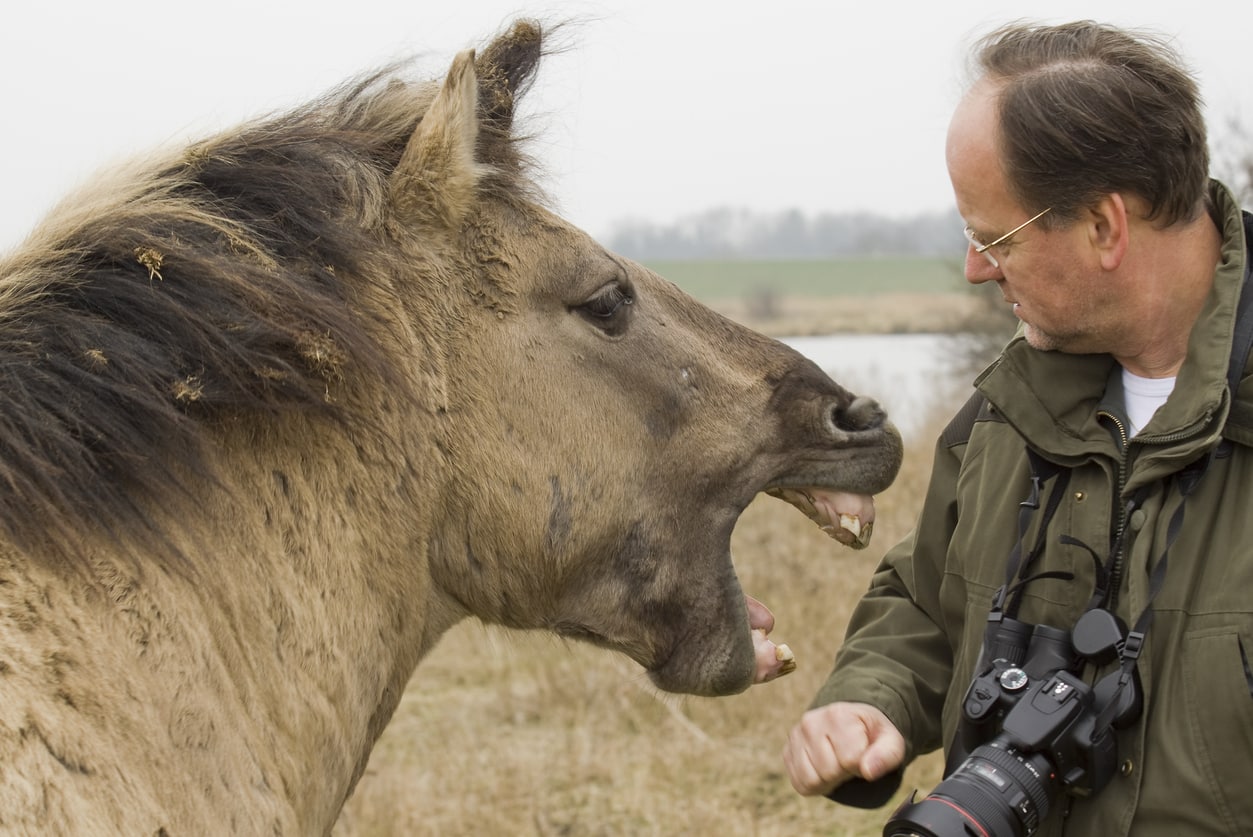While horse bites on humans are rare, they can cause health complications ranging from minor injuries to severe infections when they occur. Scientific research shows that about 2% of hospital emergency admissions relate to animal bites (which of course, includes horse bites).
Whether you’re a new horse owner or have been riding for many years, you need to know why horses bite people and ways to prevent it. After all, horses may be grass eaters, but they have strong jaws and surprisingly sharp teeth that can crush your fingers. An injury like this can limit interactions with your beloved buddy or disrupt your daily activities.
To prevent such injuries, I’ll help you understand:
- The common causes and types of a horse bite
- What you should do immediately after a horse bite
- Simple ways to prevent your horse from biting you
After reading this post, you’ll know how to get your horse to trust and respect you as you truly deserve, with zero whipping or punching involved.
Why Do Horses Bite Humans?
Horses interact with each other through nipping and biting to show aggression, affection, or anything in between. That means even though your beloved horse might be showing you how much they love you, it could cause you injuries! Let’s dive deeper into why horses bite people and the possible remedies.
1. Horses Bite Because of Hostility
If they’re anxious, angry, in pain, or otherwise uncomfortable, horses can practice self-defense through aggression towards people. They mainly do this through kicking and biting.
The following signs will help you know if your horse might be biting out of hostility:
- It moves the head closer to you and quickly opens and closes its mouth
- The horse flattens the ears backward and moves the tail rapidly
- The horse quickly opens the mouth to make a loud “smacking” sound
The solution to this kind of biting is to try and figure out what exactly is causing your horse pain or discomfort, and then try to correct that specific issue. We’ll talk about this more in a minute.
2. A Horse Bite Can Result From a Tight Girth or an Uncomfortable Saddle
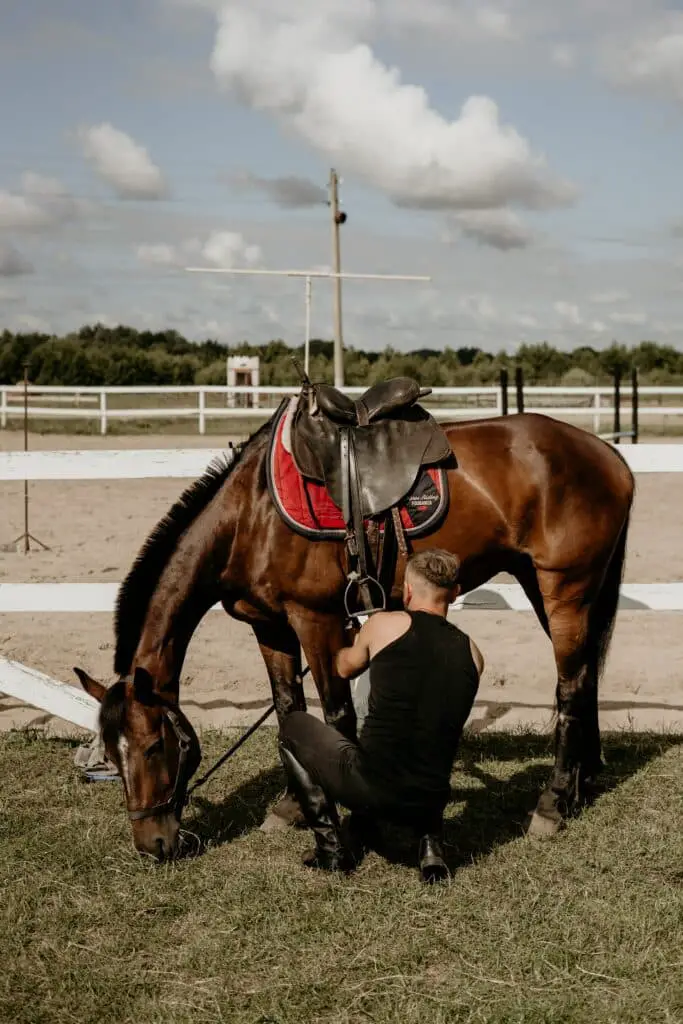
If biting is uncommon with your horse, then biting could be a result of a more specific problem. For example, a tight girth could cause agitation that results in a horse bite. That means you shouldn’t tighten the girth excessively to give your horse confidence that you won’t hurt it when riding.
To determine the right girth size, measure the distance from the center of the horse’s chest in the girth area to the widest part of the ribcage. Then, multiply the measurement by two to estimate a suitable girth size that won’t hurt the horse.
In a similar way, problems with the fit of your horse’s saddle can cause uneven pressure on your horse’s back, resulting in quite a bit of pain when riding. As a result, the horse might bite you as a means of showing discomfort.
You’ll want to ensure the saddle you use fits the horse perfectly without affecting its natural movements. Here is my guide on how to measure for a saddle in order to make sure you get the proper fit!
3. Horses Bite Because of Allogrooming
Allogrooming is a caregiving process through physical contact involving the mouth. It includes biting, nibbling, and scratching body parts like the neck to show affection. Horses most often do this to one another, but they also may try and do it to other animals like dogs, or even to you.
As a horse lover, there are times you want to mimic allogrooming by scratching your horse’s neck. As a result, the horse returns the favor by grooming you, posing a risk of a serious bite. For this reason, don’t let it groom you. Push your horse’s head away firmly when it tries to initiate allogrooming to avoid dangerous bites that come along with it.
Types of Horse Bites
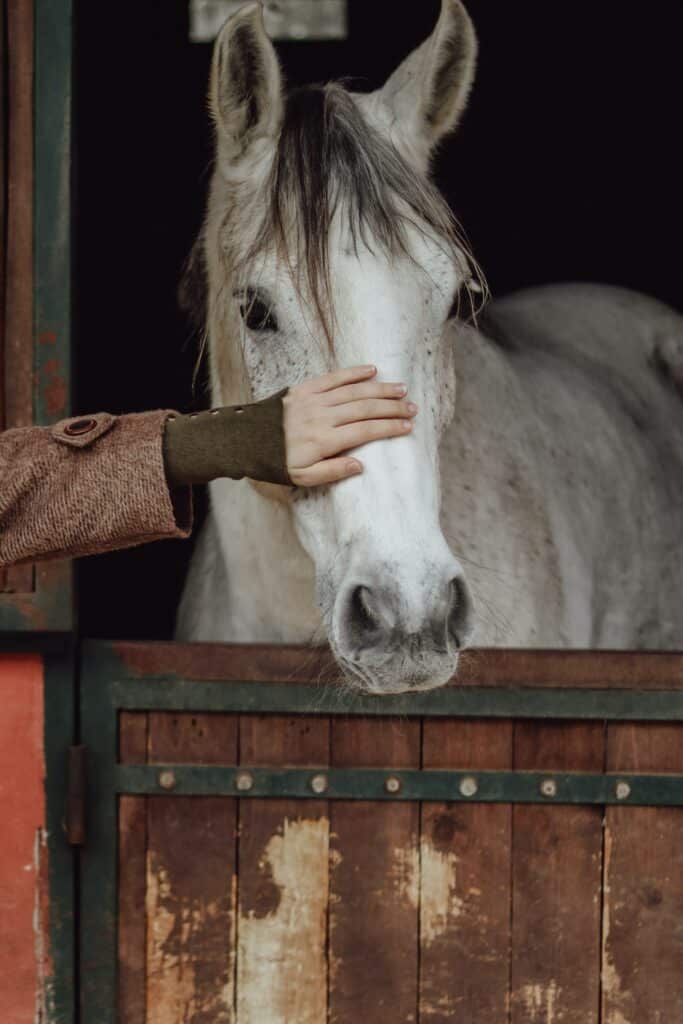
In general, horse biting comes in three forms:
Playful Bites
As the name suggests, this type of horse biting occurs when the horse is trying to play with the handler. It’s pretty common in curious young horses. These types of bites may hurt a little but usually don’t cause serious injuries.
Defensive Bites
Defensive horses bites occur when the horse is scared. Horses use this type of bite when defending themselves against a situation they perceive as dangerous, like when you’re administering injections. Defensive horse bites can result in mild injuries that require medical attention.
Aggressive Bites
These bites tend to be the most dangerous and most likely to cause severe injuries. In the worst-case scenario, an aggressive horse can even chew your finger and lead to amputation!
To avoid such serious health complications, let’s look at what you should do when injured and effective ways to prevent horse bites.
How to Prevent and/or Stop Horse Biting
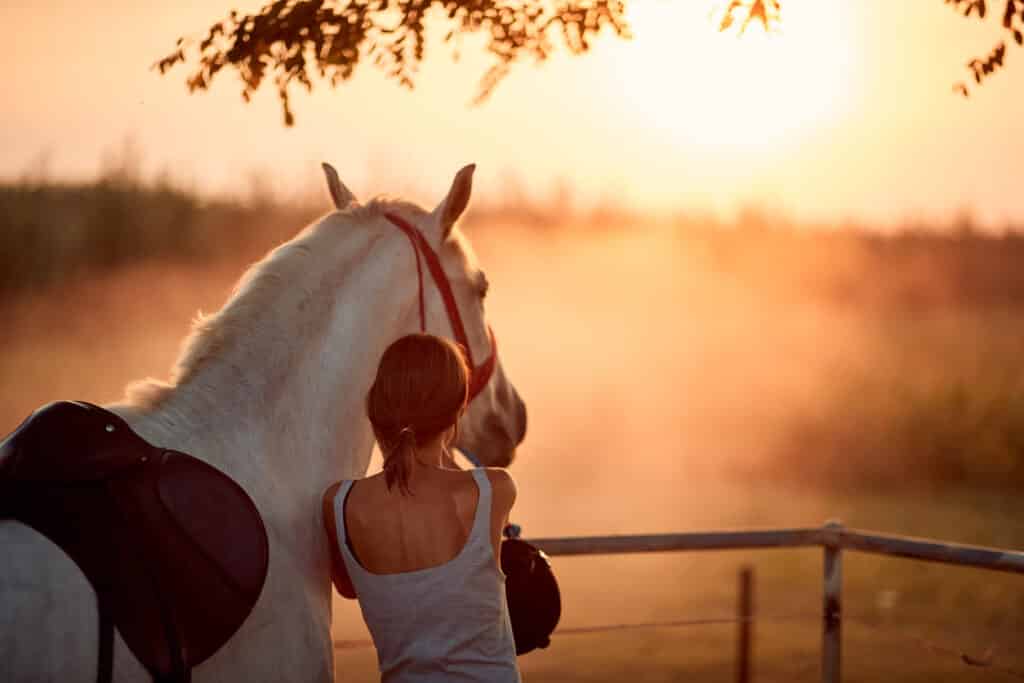
After identifying why your horse is biting people, create a plan to eliminate this habit before it causes serious consequences. Here are some things you can do to reclaim your horse’s respect and obedience:
1. Establish Your Dominance
A crucial part of building a relationship with your horse is to take the position of power. After all, a horse that acknowledges you as the leader is less to adopt biting habits. If your horse is acting aggressively towards you, they are likely questioning your leadership role.
The trick of establishing dominance over your biting horse is based on two things. First, forcing the horse to move when it prefers not to. Second, inhibit your horse’s movement when it wants to flee.
For instance, use the “backing” technique to establish your dominance. With the horse standing in front of you, create pressure that’ll force it to move backward. If you’re working with an extra anxious or angry horse, you can also try walking towards the horse while shaking a stick. (Although I recommend that you work with a trained professional in this case for safety reasons!)
2. Earn Your Horse’s Respect
Once you’ve established dominance, you need to earn your horse’s respect. To achieve that, make the horse comfortable if it does things right and uncomfortable if it becomes disobedient. That way, your buddy will learn to maintain a respectful distance. Here are some more exercises for building a strong bond with your horse that will result in mutual love and respect.
3. Start Training Your Horse While It’s Still Young
The biting behavior begins when a horse is still young, especially for colts (young uncastrated males). Colts mostly use their mouths to explore the world. If you start the anti-biting training when a horse is still young, it will grow with the good habits instilled into its mind. Click here to learn more about young horses, a.k.a. “green” horses.
4. Hire a Professional to Deal With the Problem
Depending on how serious the horse biting is, it may be necessary to hire a professional trainer and completely re-train your horse. A professional has the experience, skills, and necessary tools to deal with a hostile horse. This can be really important when considering your safety and that of the other people and animals who might come into contact with your horse.
Note: Illnesses and infections are also a cause of horse bites. If you feel that sickness is stimulating the biting habit in your horse, seek medical attention immediately from your vet.
What Should You Do If a Horse Bites You?
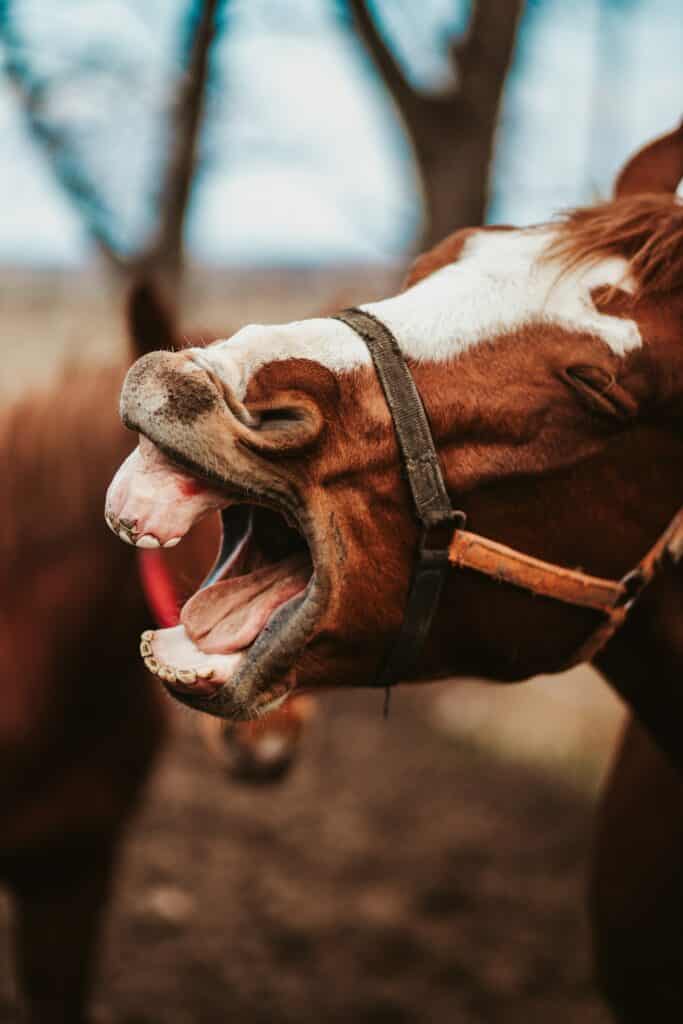
Statistics show that about 4.5% of human injuries involving horses relate to bites. Because horses have strong jaws, the seriousness of the injuries ranges from minor bruises to severe damages. Horse-bite infections in the wound can worsen the situation and have severe consequences if you don’t control them. So, here’s what you should do in case of a horse bite.
Note: All of this info is for informational and educational purposes only and is not medical advice! You should also talk to your doctor and/or veterinarian for individualized advice for you and/or your horse.
Determine the condition of the bite — minor, mild, or severe. If the bite slightly breaks the skin, it’s a minor wound. Just clean the affected area with clean water and soap, and then keep it clean while it heals.
If the wound is more moderate or severe, you should immediate medical attention. A doctor will be able to:
- Examine the wound and decide the appropriate medical procedures that suit your situation.
- Establish all the risk factors for infection and take the necessary precautions.
- Give you the right wound management procedures to enhance quick recovery.
What NOT To Do If a Horse Bites You
How should you react when your horse bites you? As a general rule, don’t strike your horse after it bites you. Violent responses won’t work because it makes the horse feel more threatened and makes it more aggressive. Instead of striking the horse, distract it with a verbal or physical response.
For example, you can lightly tap the horse’s shin with a boot or shoe to discourage it from biting people again. The goal here is to stop the horse’s bad behavior and maintain trust between you. For some similar tips, here are the best ways to deal with a pushy horse.
Frequently Asked Questions About a Horses Bite
Can Horse Bites Cause Rabies?
Yes, but only if the horse is infected with the disease. According to the WHO, rabid horses become aggressive and bite fiercely. If you’ve been bit by a horse and are worried about rabies, talk to your doctor.
Is My Horse Showing Affection When It Bites Me?
Playful nibbles that don’t result in any serious injuries can be a way of showing affection. However, you shouldn’t encourage this habit as it can quickly transform from a playful nibble to a severe bite that symbolizes disrespect. After all, your horse shouldn’t initiate any contact but respect your personal space.
Conclusion
Horses can bite for a variety of reasons, and some are a lot more dangerous than others! Bite wounds can range from a small bruise all the way to a serious injury if you’re not careful.
For safety, horse owners should take steps to prevent aggressive horse biting and we’ve shared a few ways you can do that in this article. As always, if you need extra help with your anxious or angry horse, don’t be afraid to enlist a professional if you need some help with your horse training!

